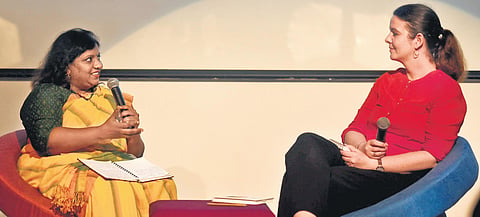

CHENNAI: The first image to surface when envisioning the fight for freedom would be that of two men, Mahatma Gandhi and Jawaharlal Nehru, whose contributions echo through the annals of history. Look a little closer, and names on the margins of the history books will consist of tales as gripping as those on the cover.
Historian and heritage enthusiast Nivedita Louis in conversation with Goethe-Institut director Katharina Görgen, on Sunday, spoke about the women’s representation in the freedom struggle of India. Delving into the freedom movement of India and the Suffrage movement of Germany, the speakers spoke about how women were under represented in history. Katharina shared, “Wherever we go, always ask where the women are. In the book The Trouble With Women, the idea is that women’s intellect is not for invention or creation and her great function is to praise men.” She wondered if women weren’t prominent in the freedom struggle because they were busy praising men.
Forgotten tales
Nivedita added to the conversation by mentioning Dr Muthulaxmi Reddy, a trailblazer in many fields. She shared, “Dr Muthulaxmi was a multi-hyphenate. She was the first woman speaker of the legislative assembly. She was south India’s first woman doctor. Despite this, people don’t speak of her as a major political icon. She made everlasting changes in state legislature. With her initiation, an all-women police station was started.” The historian stated that people selectively chose her achievements.
She added, “When I wrote my first book Muthal Pengal (stories of First Women from erstwhile Madras), I had no clue that I would stumble upon 45 women whose contributions have been forgotten.” When history textbooks give the idea of selective women icons and filter out their achievements, their fights are forced to be overshadowed. Nivedita spoke of how contributions of Rani of Jhansi are mentioned everywhere but fighters like Rani Mangammal, Velu Nachiyar are often ignored.
About the women in Germany, Katharina spoke, “Even though Germany doesn’t have anything comparable to the freedom struggle and the history of women’s voices recorded, the idea of women behind the men can be inferred. The indirect hard work is what is prominent throughout.”
The speakers also talk about how women from the minorities and the oppressed communities faced a greater discrimination during the freedom struggle. Nivedita stated, “Germany gave women the right to vote based on the wealth they had. It was always for women from upper communities and women who had enormous wealth.”
Drawing strength
Despite the oppression and selective representations, the talk summed up that a look into the unsung tales will paint the picture of a powerful women community that paved its own path to victory. Most of the women turned the freedom struggle into an opportunity for them to grow as a community. Nivedita shared, “The freedom struggle was like a whiff of fresh air. Women who weren’t allowed to go out of their houses were suddenly given the freedom to fight for the country. Learning Hindi also turned out to be a unifying factor for the women from different parts of the country.”